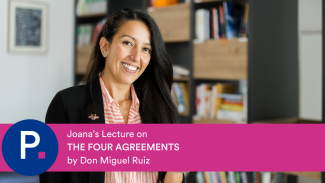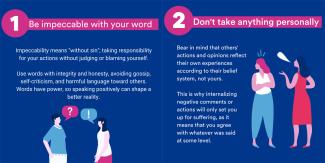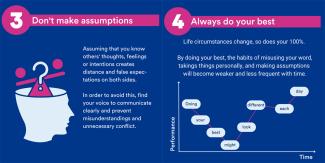What We (and You) Can Gain from The Four Agreements

During our Autumn Offsite in 2024, Joana Diez from our Customer Success team introduced Don Miguel Ruiz's The Four Agreements, exploring how Toltec wisdom remains relevant today. The book encourages readers to embrace freedom, happiness, and love, ultimately leading to better relationships with others and themselves.
A group of 25 PRISMAtes joined Joana’s session to discover new ways to nurture happiness. The session began with a few minutes of visualization and breathwork:
- How does your most joyful self look?
- How do you feel in your relationships and actions?
The basics of the book suggest that everyone lives in their own "dream," shaped by the agreements we unknowingly make since birth. Throughout the session, participants reflected on how early teachings might negatively influence their daily lives and considered new agreements that could help bring out their true selves.
Let the Discussion Begin
The discussion centered on the Four Agreements:
1. “Be impeccable with your word”
The group agreed that in the workplace, this means thinking before speaking, expressing oneself clearly, avoiding harm to others, and recognizing the responsibility our words carry.
2. “Don’t take things personally”
Do you feel hurt or triggered by what others do or say? This agreement refers to the fact that each person acts according to their background and belief system. Therefore, nothing anyone does or says is truly against us or our real selves. The group acknowledged that it can be challenging due to fluctuating emotions, moods, resilience, and self-worth.

3. “Don’t make assumptions”
This sparked the biggest discussion. While some felt that assumptions help prepare for possibilities, they also acknowledged that assumptions create unrealistic expectations. The consensus was to distinguish assumptions from facts and replace them with clear questions like, "What makes you say that?" or "Can you elaborate?"
4. “Always do your best”
The last agreement ties the others together. Juggling family, social, and work life can be challenging, and we can't excel in all areas every day.
The key is BALANCE and SELF-AWARENESS:
Everyone's best changes day to day based on life’s circumstances. Some days, it will be 100%, and others only 20%. The key is to value and love your effort, even if you fall short.
Accept and respect your limits.
Understand what’s needed and focus fully on the task at hand.
In moments of frustration, be kind to yourself and try harder the next day. Getting back on track will boost your confidence and help shift your mindset to prevent negative emotions from taking over.

Key Takeaways: What We Learned
-
Words matter: We are aware of the responsibility and consequences of our spoken words. We think first, then speak and act accordingly, choosing respectful, honest words that won’t hurt ourselves or our coworkers.
-
Perception is personal: Perception and experience are unique to each individual. It’s important to recognize your triggers, do some inner work, and stay open-minded rather than letting emotions take control.
-
Avoid assumptions: Assumptions may help us prepare, but we don’t always know the full context of a person or situation. It’s better to ask a clear question than assume we know the answer.
-
Our “best” varies: Our “best” can vary every day. Sometimes, it’s about meeting the basic requirements and finding balance across all duties. Even when things don’t go perfectly, our effort is valued. The key is to enjoy what we do.
For further reading on The Four Agreements, you can explore the book by Don Miguel Ruiz here: The Four Agreements on Amazon.
